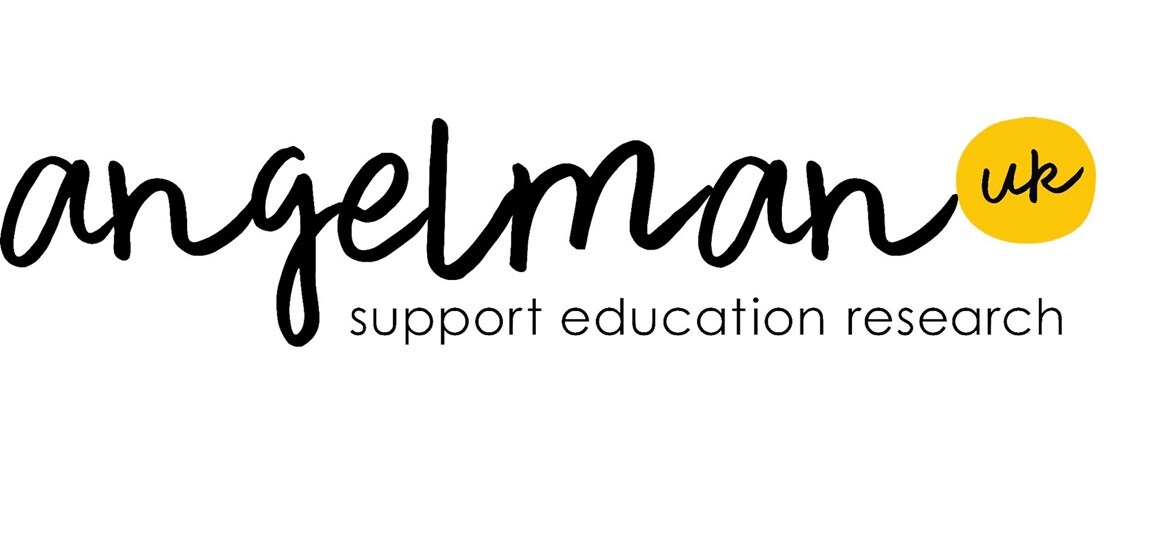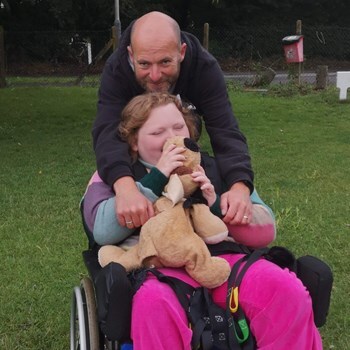Rich Williams
My Story
In 2002, like any new Dad, my world was turned upside down when Holly arrived with a fanfare. All was as expected for a few weeks and then questions started to be asked. Initially, this led to a heart defect diagnosis which was then corrected by surgery aged 6 months.
After development delays were identified and investigations began, Holly developed significant epilepsy- scaring everyone who knew her in the process. Nobody could explain it or really help us other than to try to find the right medication to control it.
Shortly afterwards, in early 2004, we received the diagnosis. Holly had Angelman Syndrome. What is it we asked? The doctors weren't quite sure because it was very rare but they did give us the contact details of ASSERT (now known as AngelmanUK) and we were told to google it.
The parent that answered the phone listened. And understood. And empathised. And offered help- inviting us to the next family conference in Loughborough. With a lot of nerves we set off and lives were changed forever. No longer were we relying on doctors for all of the answers to our questions. In that first visit, we became part of the Angelman community.
Inspired by this support (at a time when the internet was still emerging), I volunteered to be a trustee. I remained a trustee through multiple life events until 2018 and was deputy chair when I finally stood down.
So what is Angelman Syndrome?
Angelman Syndrome is a rare neurological disorder affecting around 1:20,000 births. Characteristic features include delayed development, severe learning difficulties, little or no speech and issues with movement and balance. Although those affected have a normal life expectancy, they will require support throughout their lives.
As it is rare, most people will never have heard of AS before.
In simple terms, AS is caused by one of several different types of disruptions of a region of Chromosome 15, all involving a single gene, UBE3A.
AS was first identified in 1965 by a British doctor, Harry Angelman, for whom it is now named. Dr Angelman had noticed similarities between a small number of previously undiagnosed children under his care, seeming to indicate they had common issues. After seeing a painting in a museum in Italy called ‘A Boy with a Puppet’, he was inspired to write a medical paper titled ‘Puppet Children’, due to the characteristic happy demeanour and stiff jerky movements of the children.
At first, little was known of the disorder and few other cases were identified. During the 1980s advances in genetic medicine made it possible to diagnose increasing numbers of cases and also to start identifying the cause. The name Angelman Syndrome was adopted in 1982.
In 2005, Holly's mum, Lesley, and I separated.
I introduced Sue to the world of Angelman Syndrome in 2007 and she joined me as a trustee shortly afterwards- inspired both by Holly and the other families that we met.
A few months before Sue and I were due to get married in 2009, Holly spent a number of weeks in Bristol Children's Hospital ICU- much of it intubated. Not to do things by halves, she was their first case of swine flu and both Lesley and I had to have 'the' conversation about quality of life with the medical team. Due to Max's imminent arrival, Sue co-ordinated the extended family unit known as TeamHolly from the local cafe after she was asked to leave by the hospital. Throughout all of this we remained in regular contact with other families both in the UK and further afield thanks to those charity connections.
After more long stays in hospital, with multiple long periods on a ventilator, Holly is now a 21 year old, opinionated inspiring woman. Not only has she taught me many of the things that I now am, she has also had a profound effect on us all- including Max (who is already a seasoned campaigner and advocate for AngelmanUK).
TeamHolly is still going strong and we are still in touch with many of those families on their own unique paths.
Its an honour to run London for AngelmanUK in my 50th year. Not just for those with Angelman Syndrome and their families today- but also for those families yet to enter this mad, crazy (and ultimately positive) world. Its also as a thank you to those trustees back in 2004 who literally gave me the answers I needed, those before them, those I worked with and those who now take up the mantle.
Please support me in this mad, midlife crisis idea.






